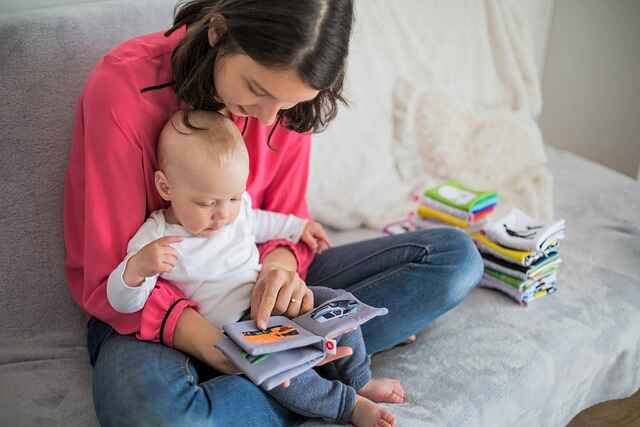“Parenthood is the most profound joy and the deepest love you’ll ever experience.” – Oprah Winfrey.
As a parent, there is nothing more fascinating than watching your child grow and explore the world around them. From their first tentative steps to infectious laughter, each milestone and behold. One of the most fascinating aspects of early development is how children experience the world through their bodies. (Source). To understand our little ones better, here’s a guide to your baby’s five senses
Also, Read How to Boost Your Baby’s Brain Development
1. Eye Sight – Painting the world with colors
At birth, your baby’s vision is still developing and he sees the world through a somewhat blurry lens. However, the magic lies in their ability to detect contrast, and their attention is drawn to high-contrast patterns and colors. Research shows that by the age of two months, infants can distinguish between basic colors, and by four months, they have developed depth perception that allows them to reach for objects.
Top tip for parents ft. Baby’s Five Senses:
Provide your child with colorful toys and objects that stimulate their visual senses and promote healthy eye development. For young and new parents, protecting your baby’s developing eyesight is vital. Avoid exposing them to screens and hazardous objects to prevent accidental eye injuries. If your baby consistently avoids eye contact, fails to respond to visual stimuli, or shows signs of crossed eyes or excessive tearing, it may indicate a need for a pediatric eye specialist’s examination.
2. Hearing – Dancing to the rhythm of sounds
Even before birth, babies are exposed to a symphony of sounds in the womb. Upon arrival, they have well-developed hearing and can recognize familiar voices, especially those of their parents. According to studies, newborns are attracted to rhythmic sounds and are sensitive to changes in pitch.
Top parenting tip:
Engage your baby with music, nursery rhymes, and soft sounds to stimulate their auditory senses and encourage a deeper bond with you. Shield your baby’s delicate ears from loud noises and limit prolonged exposure to prevent potential hearing concerns. If your baby doesn’t respond to sounds or familiar voices or if there’s a delay in speech development, seeking guidance from an audiologist for a hearing evaluation is essential as quickly as possible.
3. Taste – Adventures in Flavorland
From the first taste of milk to his culinary discoveries as he grows, a child’s taste plays a key role in shaping his preferences and eating habits. Did you know that babies are born with a sweet taste because of the natural sugars in breast milk? As they transition to solids, they begin to enjoy new tastes and textures.

Top tip for parents:
Introduce your child to a wide variety of healthy foods and let them enjoy different flavors to develop a flavor for all nutrients. If your baby consistently refuses to eat or has difficulty swallowing, it could signal an underlying issue that requires evaluation by a pediatrician or a pediatric nutritionist.
4. Touch – One of the Important Baby’s Five Senses
Skin-to-skin contact is not only soothing for babies but also vital for their tactile development. Their sense of touch is remarkably sensitive from birth and they can sense even the gentlest caress. As they grow, they become curious explorers who discover the world through touch.
Top tip for parents:
Encourage sensory play with soft fabrics, textured toys, and gentle massages to enhance your baby’s sense of touch and encourage emotional bonding. Handle your baby gently and ensure safe surroundings to protect their sensitive skin. Look for signs of discomfort or excessive crying during touch-related interactions, as it may indicate potential sensory processing considerations. Consulting with a pediatric occupational therapist can offer valuable insights.
Also, Read Virtual Autism: A New Threat in Children Aged 0 to 3 Years
5. Smell – Decoding scents
Newborns have a well-developed sense of smell that helps them bond with their caregivers and find comfort in familiar scents. Research suggests that babies can even tell the difference between their mother’s milk and that of another nursing mother based on smell alone.

Top tip for parents:
Surround your baby with pleasant scents, such as soft baby milk or natural scents, to create a soothing environment and nurture their olfactory senses. Prevent exposure to strong chemical odors or synthetic fragrances, opting for mild baby lotions or essential oils instead. If your baby doesn’t react to strong odors or familiar scents, or displays signs of nasal congestion, it’s advisable to consult a pediatrician or an ENT specialist for further evaluation.
Watching your child explore the world with their five senses is a remarkable journey full of wonder and joy. Understanding the development of their sight, hearing, taste, touch, and smell allows you as a parent to provide the right stimuli and enrich their sensory experiences.
As you ride on this adventure with your little one, remember that every giggle, curious look, and excited babble is evidence of their extraordinary sensory exploration. So enjoy these precious moments, armed with the knowledge of how your baby’s five senses are flourishing, and guide them through the captivating world around them!





